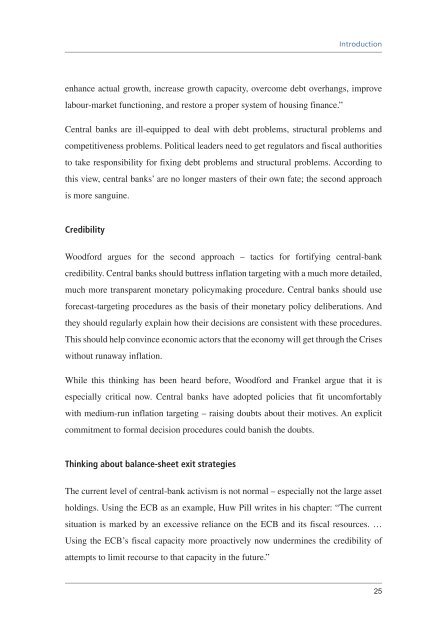Is inflation targeting dead? Central Banking After the Crisis - Vox
Is inflation targeting dead? Central Banking After the Crisis - Vox
Is inflation targeting dead? Central Banking After the Crisis - Vox
You also want an ePaper? Increase the reach of your titles
YUMPU automatically turns print PDFs into web optimized ePapers that Google loves.
Introductionenhance actual growth, increase growth capacity, overcome debt overhangs, improvelabour-market functioning, and restore a proper system of housing finance.”<strong>Central</strong> banks are ill-equipped to deal with debt problems, structural problems andcompetitiveness problems. Political leaders need to get regulators and fiscal authoritiesto take responsibility for fixing debt problems and structural problems. According tothis view, central banks’ are no longer masters of <strong>the</strong>ir own fate; <strong>the</strong> second approachis more sanguine.CredibilityWoodford argues for <strong>the</strong> second approach – tactics for fortifying central-bankcredibility. <strong>Central</strong> banks should buttress <strong>inflation</strong> <strong>targeting</strong> with a much more detailed,much more transparent monetary policymaking procedure. <strong>Central</strong> banks should useforecast-<strong>targeting</strong> procedures as <strong>the</strong> basis of <strong>the</strong>ir monetary policy deliberations. And<strong>the</strong>y should regularly explain how <strong>the</strong>ir decisions are consistent with <strong>the</strong>se procedures.This should help convince economic actors that <strong>the</strong> economy will get through <strong>the</strong> Criseswithout runaway <strong>inflation</strong>.While this thinking has been heard before, Woodford and Frankel argue that it isespecially critical now. <strong>Central</strong> banks have adopted policies that fit uncomfortablywith medium-run <strong>inflation</strong> <strong>targeting</strong> – raising doubts about <strong>the</strong>ir motives. An explicitcommitment to formal decision procedures could banish <strong>the</strong> doubts.Thinking about balance-sheet exit strategiesThe current level of central-bank activism is not normal – especially not <strong>the</strong> large assetholdings. Using <strong>the</strong> ECB as an example, Huw Pill writes in his chapter: “The currentsituation is marked by an excessive reliance on <strong>the</strong> ECB and its fiscal resources. …Using <strong>the</strong> ECB’s fiscal capacity more proactively now undermines <strong>the</strong> credibility ofattempts to limit recourse to that capacity in <strong>the</strong> future.”25














